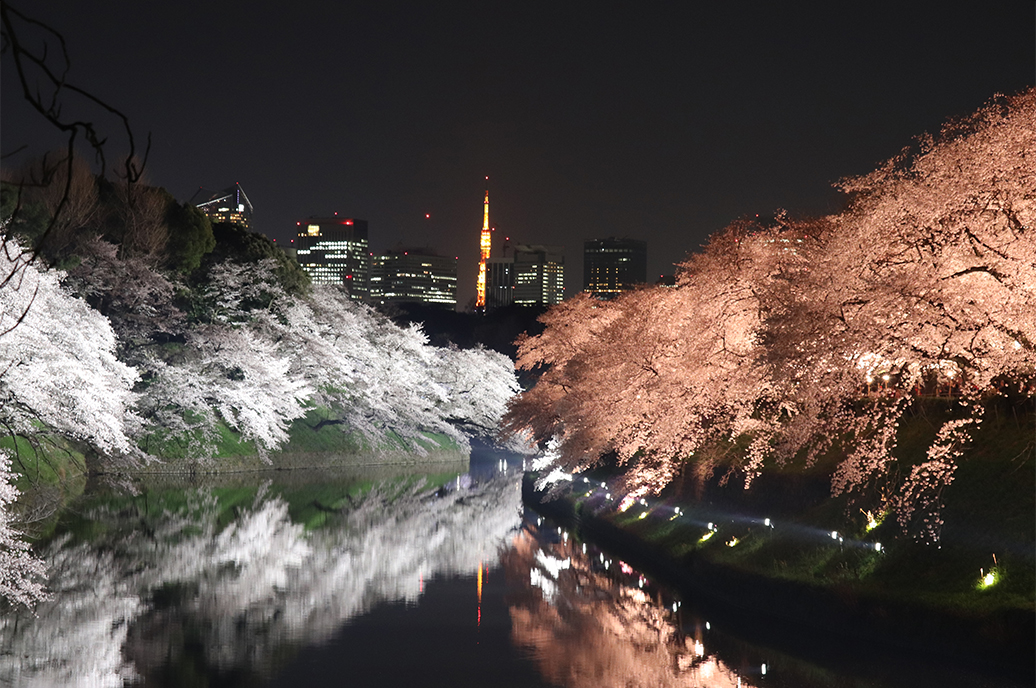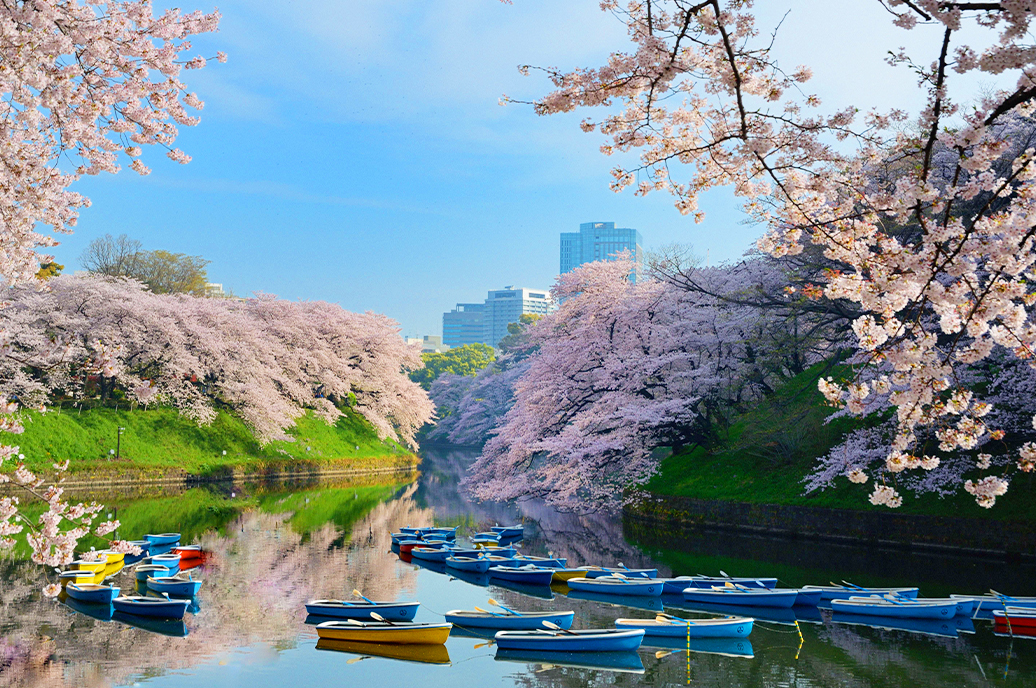- HOME
- Sakura Festival Top
- Illuminations, Boat Pier & Sakura Highlights



The Chidori-ga-fuchi Green Way is a 700-meter path that runs along the Chidori-ga-fuchi moat to the west of the Imperial Palace. It extends from the entrance of the Chidori-ga-fuchi National Cemetery up to Yasukuni-dori Street. Approximately 230 Yoshino and Oshima cherry trees that line the Chidori-ga-fuchi Green Way create a tunnel-like path of pink blossoms that is one of the most recognized sakura sights in all Japan.
During sakura season, more than one million spectators from around Japan come to see the blossoms here.
*On Saturdays and Sundays during the illumination period, from 9:00 a.m. to 9:00 p.m., there will be one-way traffic from Yasukuni-dori Ave. to the entrance of Chidori-ga-fuchi National Cemetery. Please note that you cannot enter from Hanzo-mon Gate side entrance.
*Due to the large number of visitors each year, access to the Chidori-ga-fuchi Green Way may be restricted during times of particular congestion.
*As there is no parking available at chidori-ga-fuchi Green Way and Kudanzaka Park, we ask that visitors do not come by car.
*Restaurants, food carts and stalls serving food and beverages are not available along the Green Way.
| Location | From Kudan-minami 2-chome to Sanbancho |
|---|---|
| Access |
5 minutes walk from Exit 2 of Tokyo Metro Kudanshita Station 5 minutes walk from Exit 5 of Tokyo Metro Hanzomon Station *To the Green Way entrance |

After exiting Kudanshita Station, walk along Yasukuni-dori Street, keeping Nippon Budokan on your left. There will be various groups celebrating under the cherry blossoms as you walk.
After continuing along Yasukuni-dori for another 5 minutes, a large Torii gate will come into view on your righthand side. You have arrived at Yasukuni-jinja Shrine.
Inside the shrine grounds, there are around 400 Yoshino and Oshima cherry trees, as well as other species of sakura. Yasukuni-jinja is even home to the official Yoshino cherry tree used by the meteorological agency of Japan to gauge and announce the start of Tokyo's sakura season.
| Location | 3-1-1 Kudan-kita |
|---|---|
| Access | 5 minutes walk from Exit 3a of Kudanshita Station |

The sakura trees in Kitanomaru Garden were planted in the late 1940's and early 1950's. The beautiful pond and green grasses that cover the garden combined with around 230 Yoshino cherry trees make it one of the city's premier blossom-viewing locations.
On the Chidori-ga-fuchi side, a path along the embankment affords views of sakura trees with their branches draped softly above the water. Here, sakura lead the dogwood and tabu trees towering overhead in a procession of spring blossoms.
The blossoming branches of sakura stretched out over the moat are truly a sight to behold.
| Location | 1-1 Kitanomaru-koen |
|---|---|
| Access | 5 minutes walk from Exit 2 of Kudanshita Station 5 minutes walk from Exit 1b of Takebashi Station |
| Contact | Kokyogaien National Garden Office, Kitnomaru Garden Office TEL:03-3211-7878 |

Chidori-ga-fuchi Park is located between the British Embassy and Chidori-ga-fuchi moat on the west side of the imperial palace. It extends from the Chidori-ga-fuchi Green Way across Daikancho-dori Street up to Hanzo-mon Gate at the Imperial Palace.
Chidori-ga-fuchi Park is home to around 170 sakura trees, including Yoshino and Mountain cherry types. During the sakura festival, many visitors to the Chidori-ga-fuchi Green Way stop here to rest their feet and celebrate the blossoms with friends and family.
1. Use of machinery (including power generators) or noise-emitting devices such as karaoke players is prohibited in the park.
2. Please bring your garbage with you when you leave.
3. Do not use tarps or sheets to save a spot in the park.
4. Do not use spikes to fix your tarp to the ground.
5. Behavior that may harm or damage the park's trees is prohibited.
6. Food carts or other unlicensed vending are prohibited in the park.
7. Behavior that may offend or disturb fellow picnickers or the surrounding community is prohibited.
*Markers have been placed to indicate park boundaries. Please use the area on the side nearest the road for picnicking purposes.
| Location | 1-2 Kojimachi, 2 Ichibancho |
|---|---|
| Access | 3 minutes walk from Exit 3 of Hanzomon Station on the Hanzomon Line |
| Contact | Chiyoda Roads & Parks Division TEL:03-5211-4243 |

The East Garden of the Imperial Palace is located in the center of the former Edo Castle's main keep and outer citadel and covers an area of around 210,000㎡. Here, you will find one of the capital's largest sites of cultivated sakura, all within a tranquil verdant landscape.
Behind an expansive plaza of green grass, a cluster of Yoshino and Oshima (Kanzan) sakura stand among a forest of Edohigan trees. Visitors can even spot wild cherry trees (yamazakura) scattered among a grove of diverse tree species. In total, around 280 sakura trees call these gardens home.
While entering the East Garden of the Imperial Palace is free of charge, visitors are asked to abstain from playing sports or drinking alcohol while inside. This request has had the added benefit of keeping the garden relatively uncrowded which allows visitors to view the blossoms in their purest form, undisturbed.
A hidden gem among sakura lovers, early-blooming varietals, such as Kawazu-zakura, can also be seen here at the start of March.
| Location | 1 Chiyoda |
|---|---|
| Access | 5 minutes walk from Exit C10 of Otemachi Station 5 minutes walk from Exit 1A of Takebashi Station |
| Garden hours | 9am to 5:00pm (Last entrance at 4:30pm) - March 1 to April 14 9am to 6pm (Last entrance at 5:30pm) - April 15 to August 31 |
| Closed | Mondays and Fridays However, the garden is open for public holidays except on the emperor's birthday. When Monday is a public holiday, the garden will be closed on the Tuesday immediately following. December 28 to January 3 For special events or other unavoidable circumstances that required the garden to be closed |
| Contact | Imperial Household Agency TEL:03-3213-1111 |

Sotobori Park extends along the outer moat (sotobori) which consists of three sections: Ushigome-bori, Shinmitsuke-bori, and Ichigaya-bori. It spans 2 kilometers from JR Iidabashi Station to Ichigaya and Yotsuya stations.
The park is home to around 150 sakura trees, including Yoshino and wild cherry types. It also features a walking path that sits one level above the road, so visitors can relax and enjoy the blossoms without any worry of passing traffic.
Sotobori Park runs along the JR Chuo and Sobu train lines.
Even after the sakura begin to fall, visitors can still enjoy their splendor with the petals collecting on the moat's surface for a fresh and unique viewing experience.
1. Use of machinery (including power generators) or noise-emitting devices such as karaoke players is prohibited in the park.
2. Please bring your garbage with you when you leave.
3. Do not use tarps or sheets to save a spot in the park.
4. Do not use spikes to fix your tarp to the ground.
5. Behavior that may harm or damage the park's trees is prohibited.
6. Food carts or other unlicensed vending are prohibited in the park.
7. Behavior that may offend or disturb fellow picnickers or the surrounding community is prohibited.
*Do not place your tarps or sheets within the walking area as this will disturb the other visitors. Please use the greenbelt between the walking path and the road when picnicking.
| Location | Fujimi 2-chome, Kyudan-kita 4-chome, Gobancho |
|---|---|
| Access | Iidabashi, Ichigaya, and Yotsuya stations |
| Contact | Chiyoda Roads & Parks Division TEL:03-5211-4243 |

The sakura in front of the British Embassy are some of the most famous in Tokyo. They were planted in 1898 by Ernest Satow, the deputy minister at the time, in an empty plot of land in front of the British Legation. They were later donated to Tokyo prefecture. While hard to imagine today, the embassy back then offered stunning panoramic views of the ocean and Mount Fuji to picnickers sitting under its cherry trees.
*You cannot enter the facility.
| Location | Ichibancho 1 |
|---|---|
| Access | 3 minutes walk from Exit 3 of Hanzomon Station on the Hanzomon Line |